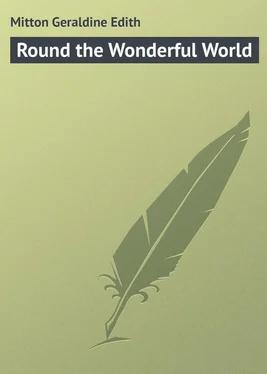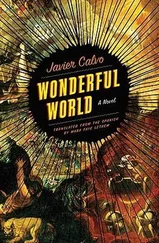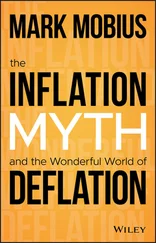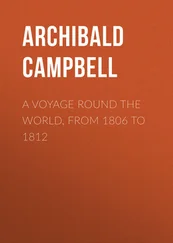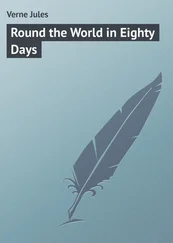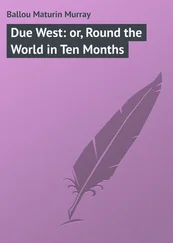Geraldine Mitton - Round the Wonderful World
Здесь есть возможность читать онлайн «Geraldine Mitton - Round the Wonderful World» — ознакомительный отрывок электронной книги совершенно бесплатно, а после прочтения отрывка купить полную версию. В некоторых случаях можно слушать аудио, скачать через торрент в формате fb2 и присутствует краткое содержание. Жанр: Путешествия и география, foreign_prose, foreign_language, на английском языке. Описание произведения, (предисловие) а так же отзывы посетителей доступны на портале библиотеки ЛибКат.
- Название:Round the Wonderful World
- Автор:
- Жанр:
- Год:неизвестен
- ISBN:нет данных
- Рейтинг книги:4 / 5. Голосов: 1
-
Избранное:Добавить в избранное
- Отзывы:
-
Ваша оценка:
- 80
- 1
- 2
- 3
- 4
- 5
Round the Wonderful World: краткое содержание, описание и аннотация
Предлагаем к чтению аннотацию, описание, краткое содержание или предисловие (зависит от того, что написал сам автор книги «Round the Wonderful World»). Если вы не нашли необходимую информацию о книге — напишите в комментариях, мы постараемся отыскать её.
Round the Wonderful World — читать онлайн ознакомительный отрывок
Ниже представлен текст книги, разбитый по страницам. Система сохранения места последней прочитанной страницы, позволяет с удобством читать онлайн бесплатно книгу «Round the Wonderful World», без необходимости каждый раз заново искать на чём Вы остановились. Поставьте закладку, и сможете в любой момент перейти на страницу, на которой закончили чтение.
Интервал:
Закладка:
The journey itself is not very interesting, and we should be glad enough to get to the end of it I fancy. No, I am not going to allow you to take me that way, not even if you begged hard! It is very useful for business men, whose one idea is to save time, but for us who want to see all we can of this glorious world it would be folly.
On the contrary, the route I should like to take is the very longest of all, and that is by sea the whole way, on one of the great liners running east. The real choice lies between this and the railway journey across France to the seaport of Marseilles, or Toulon, according to which of the great British lines of steamships we choose – the Peninsula and Oriental, known as the P. & O., or the Orient. I am willing you should decide between these routes. Think well. In order that you may understand better what the choice means I will tell you what you will see if we take the railway journey.
We shall have to start one morning from Charing Cross Station in London. All around us people are carrying bundles of rugs and magazines. Some, like ourselves, are going far east and they are parting from those who love them and will not see them again for a long time. That fair young man standing by the carriage door looks little more than a big schoolboy, but he is going out to India to help to govern there. He is a clever fellow and has passed a very stiff examination to gain this position, and he eagerly looks forward to all the new scenes in the life awaiting him. His charming mother and sister are seeing him off; they are so much alike they might be mistaken for sisters; they are trying to talk and joke lightly, but you can see how hungrily the mother's eyes are fastened on her son, as if she could never see him enough. Rightly too, for when she meets him again, he will not be the boy he is now. His face will be browned by the tropical sun, and he will have become a man; he will have an air of command which comes naturally to a man who lives, often by himself, in charge of a district, and has to rule and judge and decide for the dark-skinned people.
Close beside us there are several men smoking big cigars, and one of them says loudly, "All right, old chap, I'll bring one back for you next week; I shall cross again on Monday." He runs over to Paris on business every week and thinks no more of it than of going to his office in the morning. A trip to France is very easy when you have the means to do it comfortably.
Then we take our seats, and the train steams out of the station, leaving the crowd on the platform to scatter. After a long run, with no stops, we reach Dover and go on board a steamer which seems quite large enough to anyone who is not used to steamers. Our heavy luggage has been sent on board the big ship which will meet us at Marseilles, so we have only our handbags to carry. The crossing is quite short, and it is best to stay on deck if you don't want to be ill. The very first thing to notice, as we gradually draw away from the land, is the whiteness of the towering chalk cliffs which stand out prominently near Dover. Often you must have read of the "white cliffs of Old Albion," and if you live in the north or away from the sea, you must have wondered what they were; now this explains it all. When the Romans came over from the Continent they crossed the sea the shortest way, and in approaching this unknown island were struck with astonishment at the high gleaming white cliffs, unlike anything they had seen before; they were so much amazed that ever after the "white cliffs" were the chief feature of Britain in their eyes.
There is a break in the cliffs, where Dover now stands, and here the Romans later on made a port, and a port it has remained to this day.
If we are lucky in getting a fine day for the crossing we can sit on deck-chairs, looking at the dazzling milky-blue sea and sky until someone cries out, "There's France!"
You will not be able to make out anything at all at first, because land does not look in the least what you expect when you see it first from the sea. You would naturally search for a long dark line low down on the horizon, but it isn't like that at all. There is a hazy bluish cloud, very indistinct, and seemingly transparent, but as we draw nearer it grows clearer, and then houses and ships can be discerned, and after a good deal of manœuvring and shouting and throwing of ropes and churning up the water with the screw, two bridges are pushed across to the dock, and numbers of eager little porters, dressed in bright blue linen suits with very baggy trousers, surround us and implore us to allow them to carry our baggage.
"Me Engleesh speaking, sir."
"Good me, good man me."
"Baggage carrying me."
They are here, there, and everywhere, so good-natured, so lively, so different from the stolid English porters. Their eyes are very bright and they will take money of any kind, French or English, it matters not to them.
We have had to get our money changed on the boat, and that is the first thing that makes us feel we are really out of England. In exchange for an English gold pound we get twenty-five – not twenty – French shillings; these shillings are called francs and are not unlike our shillings at a first glance, but they are thinner and lighter. Some have the head of Napoleon, the last French Emperor, on them – these are old; the latest new ones are rather interesting, for they have a little olive branch on one side and a graceful figure of a woman sowing seed on the other, so one can interpret the meaning as peace and plenty. If you change a franc into copper you get ten – not twelve – pennies for it, and French pennies look very much like those of England. There are also half-franc pieces like little sixpences, and two-franc pieces like smaller florins, and gold pounds called Louis or Napoleons, and half-sovereigns too, but all the money seems light and rather unreal when one is accustomed to our more solid coins.
We walk up the gangway into a large barn-like place, where we meet some smart-looking men in uniform with pointed moustaches turned up to their eyes and a fierce expression. They stand behind a shelf, on which all the baggage from the boat is put, and we approach this with our bags in our hands.
The official demands in French if we have anything to declare, meaning, are we bringing across anything which it is forbidden to sell in France, such as brandy, matches, or cigarettes, for if so we must declare it and pay something to the Government for allowing us to bring it. We answer that we have nothing. "Rien, Monsieur," very politely, hoping to soften his heart, and as we both have honest faces he believes us and scrawls a chalk-mark on our bags and lets us pass. We are lucky, for now we can go straight on to the train and get good places before the crowd follows. Some unfortunate people, however, are caught. One woman who is wearing a hat with enormous feathers and very high-heeled shoes, has two huge trunks.
She tries to slip a five-franc piece into the hand of one of the custom-house officers. It is a silly thing to do, for it at once makes him think she is concealing something; very loudly and virtuously he refuses the money, hoping that everyone notices how upright he is, and then he insists on the contents of her trunks being turned out on to the counter. Piles of beautiful underclothing are spread out before all those men; silk and satin frocks come next; numberless dressing-table ornaments in silver and gold, and little bottles by the dozen; boots and shoes and books follow, while Madame begins to weep and then changes to screaming and raving. She is a Frenchwoman who has been staying in England, but she did not escape any more than an English-woman. How she will ever manage to get all her finery stuffed back into those boxes without ruining it I don't know, and we haven't time to wait to see.
Читать дальшеИнтервал:
Закладка:
Похожие книги на «Round the Wonderful World»
Представляем Вашему вниманию похожие книги на «Round the Wonderful World» списком для выбора. Мы отобрали схожую по названию и смыслу литературу в надежде предоставить читателям больше вариантов отыскать новые, интересные, ещё непрочитанные произведения.
Обсуждение, отзывы о книге «Round the Wonderful World» и просто собственные мнения читателей. Оставьте ваши комментарии, напишите, что Вы думаете о произведении, его смысле или главных героях. Укажите что конкретно понравилось, а что нет, и почему Вы так считаете.
